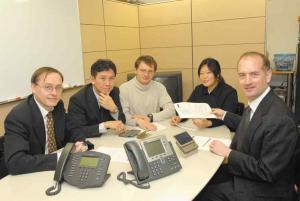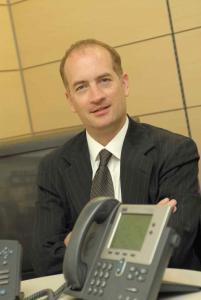J@pan Inc -- Putting the "!" Behind the "*"
Asterisk systems reach Tokyo.
By John Dodd / Photos by Andy Rain

One of the most difficult and expensive office equipment procurement decisions a manager can make is that of buying a PBX. When all most of us want is simply a phone that is easy and convenient to use, why is it that these complex and hard-to-remember systems cost more than the entire inventory of office PCs? The reason is that unlike PCs, the PBX world has long been dominated by closed systems makers who want to lock their customers into unique hardware and software.
Until now, business managers have been willing to go along with this solution, in order to get reliability and some degree of functionality-and it's just too bad if users can't remember ninety percent of those functions. But over the last five years in particular, a new technology has emerged which is based on PCs and which is becoming more and more reliable and suitable as a PBX replacement. That technology, called Asterisk, is now available in Tokyo.
We talked to Lou Leclerc, Director at Denphone, a local vendor of tested and approved Asterisk systems.
Tell us what is unique about the Denphone PBX?
Leclerc: The Denphone PBX solution is based on an open source Linux-based VOIP PBX software platform called Asterisk. This platform is unique in that feature for feature, it is as reliable as proprietary solutions offered by other vendors, yet less costly. It also has the added benefit of being fully programmable in software, so a wide variety of custom solutions can be built on top of the platform, such as integrating to a CRM system - something that is more difficult to do with proprietary systems.
Open communication protocols such as SIP and IAX are fully supported. This enables users of the Denphone PBX to connect to low cost long-distance providers in other countries, as well as being able to set up free inter-office long-distance calling over the Internet. Denphone has succeeded in integrating the Asterisk Platform to Japan's NTT telephone network. Analog, ISDN INS64-BRI as well as ISDN INS1500 PRI are fully supported.
This sounds like pioneering technology. What are the risks and rewards of using it?
Leclerc: The risks are in not understanding the requirements to make it work well. Internet capacity and connectivity issues can be complex, and it is important to choose a firm that is very experienced in this area and to follow their advice when setting up your PBX system. If you do these things, the risk in installing a Denphone PBX is no greater than choosing a PBX from one of the other major vendors.
On the reward side, there are many payoffs. Not only is it less expensive, but compared with proprietary PBX solutions, because it is open, the Denphone platform is fully programmable and expandable. This is a feature that other PBX vendors have a very difficult time matching.
Furthermore, you have access to features such as the ability to carry phone traffic over US- or European-based IP providers as well as to interconnect branch offices in different cities over the Internet without having to pay long-distance communications charges, both of which are very big financial wins.
Finally, the Denphone PBX is based on open standards for future proofing. This means that phones, new features and support will always be available, even far in the future. This is contrary to proprietary PBX systems that discontinue product lines and drop off support after several years, forcing you to purchase a new system.
"You can interconnect branch offices ...
We have a famous brand telephone PBX here at the office, which was expensive but leastwise doesn't break. What functional advantages will I see by moving to your systems? Also, what about reliability?
Leclerc: The Denphone PBX System is Linux based and is as reliable as the big name brands. Asterisk-based PBX systems are often quoted in the mainstream press as being a "disruptive technology," because it brings the full capabilities of large PBX systems in at a lower cost, much in the same way that PCs disrupted the mainframe computer market about 25 years ago. [Ed: We note that Linux derives from Unix, which was originally developed by AT&T employees to reliably support telecommunications network infrastructure.]
With the Denphone PBX, you can also do many things that you cannot do with traditional PBXs, such as have office extensions in your home, or in offices across the world, connected to each other over the Internet. You also get advanced features like voicemail, remote access, free local city calling gateways between those cities, etc.
Other features not found in ordinary PBXs include remote or cell phone access to the company PBX via login and PIN (this way, internal company extensions and longdistance calling can be made from outside in the field), as well as a variety of integrated Internet / Database / Telephony applications.
Just going back to the reliability issue, Denphone PBXs run on a proven Linux platform. The systems are shipped with RAID hard disks, and we strongly recommend UPS power. Although very rare, in the event of any difficulty, Denphone K.K. has a technical support center near Roppongi Hills in Tokyo. Varying service level agreements are available depending on the type of maintenance agreement purchased.
Do we have to have the server in our office, or can it be hosted by you?
Leclerc: Due to the nature of the Internet, we usually recommend that any PBX we install be physically located at the client site and have at least one connection to the hard NTT phone network at that site. Fully hosted Denphone solutions are also available, although we do not recommend this as a standalone business solution. We believe that for business critical environments, where the phones always must work, a one hundred percent hosted solution is not suitable, because it depends on the idiosyncrasies of a not entirely reliable Internet. It is still not  Denphone supports CISCO and Polycom uncommon for Internet routes to go down for short periods several times a day, which is not acceptable in a business telephone environment where you want your clients to always be able to reach you. Having the PBX at the client site with at least some physical connectivity to NTT ensures that call availability and quality are at NTT levels.
Denphone supports CISCO and Polycom uncommon for Internet routes to go down for short periods several times a day, which is not acceptable in a business telephone environment where you want your clients to always be able to reach you. Having the PBX at the client site with at least some physical connectivity to NTT ensures that call availability and quality are at NTT levels.
Can you tell us about Denphone?
Leclerc: Actually, there are two companies. The InVitesse Group does IT and project management consulting for major banks and foreign multinationals. The second Company, Denphone K.K., was spun off from the InVitesse Group in order to focus on the IP telephony market. Specifically, Denphone grew out of a project that InVitesse had done for a client about three years ago. That project required very specialized telephony software, which we built and delivered successfully. From this project, we realized that there was a need in Tokyo for a company that had specialized skills not only in delivering low-cost, high-capability business PBX solutions, but also in building custom telephony systems and integrating telephony applications with existing client IT, CRM and call center systems.
To provide an end-to-end solution, we are also resellers for a number of foreign telephone equipment manufacturers. We import and sell a variety of Internet telephone equipment to companies in Japan.
What kind of clients do you have?
Leclerc: Our current foreign clients are typically small- to medium-sized firms, but include Tokyo branch offices of foreign multinationals and large international investment banks. Our Japanese clients are medium-sized firms, usually looking for specific custom solutions, for example, call centers, or specific applications integrated to an existing PBX, or to databases and other IT systems.
This coming year, we plan to continue to expand our penetration in these markets, as well as move into new areas, creating new products and services that provide integrated telephony and IT solutions to our clients.
What does a typical installation look like? What equipment is needed?
Leclerc: Installations usually consist of a Denphone PBX, IP business telephones - we provide executive telephones produced by Polycom and Cisco-and connectivity to NTT, as well as connectivity via VOIP to other branch offices or to foreign based long-distance providers for cost savings. VOIP connectivity to the Internet is done with a firewall to ensure security of the PBX and client network.
For smaller businesses, if price is a prime consideration, in addition to brand-name handsets, Denphone also supports a range of lower-cost units as well. This enables us to provide very competitive solutions across the PBX price and feature spectrum.
Is it bilingual?
Leclerc: Yes. Voicemail, voice prompts, IVR voice menus are all offered in both Japanese and English and can be set individually per each user's telephone to the desired language. We can provide customized voice recording by a professional Japanese "voice talent." JI
Denphone K.K.
Managing Director: Louis Leclerc
Managing Director: Huw Williams
Azabu Nagasaka Bld #402
1-4-8 Azabu Juban Minato-ku
Tokyo 106-0045
Tel: 03-5545-4638
Fax: 03-3568-8472
Web: www.denphone.com
Email: louis.leclerc@denphone.com





